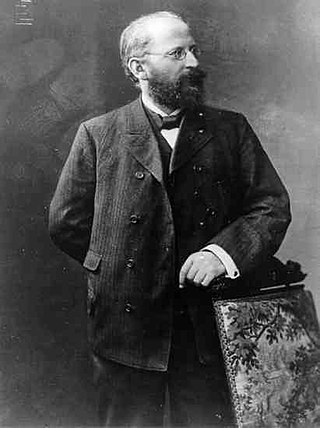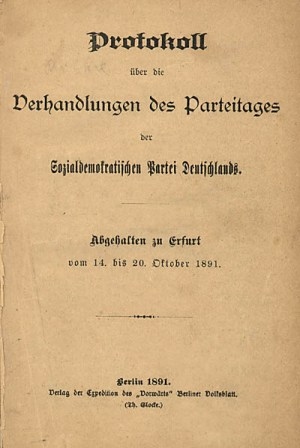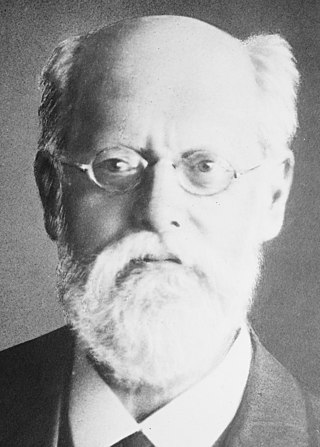Related Research Articles

The Communist Manifesto, originally the Manifesto of the Communist Party, is a political pamphlet written by German philosophers Karl Marx and Friedrich Engels. Commissioned by the Communist League and originally published in London in 1848, the Manifesto remains one of the world's most influential political documents. It presents an analytical approach to class struggle and criticizes capitalism and the capitalist mode of production, without attempting to predict communism's potential future forms.

Eduard Bernstein was a German social democratic Marxist theorist and politician. A member of the Social Democratic Party of Germany (SPD), Bernstein had held close association to Karl Marx and Friedrich Engels, but he began to identify what he believed to be errors in Marxist thinking and began to criticize views held by Marxism when he investigated and challenged the Marxist materialist theory of history. He rejected significant parts of Marxist theory that were based upon Hegelian metaphysics and rejected the Hegelian perspective of an immanent economic necessity to socialism.

The Erfurt Program was adopted by the Social Democratic Party of Germany during the SPD Congress at Erfurt in 1891. Formulated under the political guidance of Eduard Bernstein, August Bebel, and Karl Kautsky, it superseded the earlier Gotha Program.

Marxism is a left-wing to far-left method of socioeconomic analysis that uses a materialist interpretation of historical development, better known as historical materialism, to understand class relations and social conflict and a dialectical perspective to view social transformation. It originates from the works of 19th-century German philosophers Karl Marx and Friedrich Engels. As Marxism has developed over time into various branches and schools of thought, no single, definitive Marxist theory exists.
In Marxist practice, a maximum programme consists of a series of demands aiming to achieve socialism.

The first meetings of the Second International were held in Paris, beginning on July 14, 1889, on the centenary of the storming of the Bastille. Internecine conflicts within the French socialist movement had prompted the "possibilist" and Marxist factions to hold their own congresses at the same time. The Marxist congress resolved to arrange a second meeting at Zurich, while the Possibilists would arrange one in Brussels. However the Marxist organizing committee would later decide to join the Brussels congress, and the next congress would meet in 1891.

The Critique of the Gotha Programme is a document based on a letter by Karl Marx written in early May 1875 to the Social Democratic Workers' Party of Germany (SDAP), with whom Marx and Friedrich Engels were in close association.

The French Workers' Party was the French socialist party created in 1880 by Jules Guesde and Paul Lafargue, Karl Marx's son-in-law. A revolutionary party, it had as aim to abolish capitalism and replace it with a communist society.

Paul Lafargue was a Cuban-born French revolutionary Marxist socialist, political writer, economist, journalist, literary critic, and activist; he was Karl Marx's son-in-law having married his second daughter, Laura. His best known work is The Right to Be Lazy. Born in Cuba to French and Saint Dominican Creole parents, Lafargue spent most of his life in France, with periods in England and Spain. At the age of 69, he and 66-year-old Laura died together by a suicide pact.

Jules Bazile, known as Jules Guesde was a French socialist journalist and politician.

Impossibilism is a Marxist theory that stresses the limited value of political, economic, and social reforms under capitalism. As a doctrine, impossibilism views the pursuit of such reforms as counterproductive to the goal of achieving socialism as they stabilize, and therefore strengthen, support for capitalism. Impossibilism holds that reforms to capitalism are irrelevant or outright counter-productive to the goal of achieving socialism and should not be a major focus of socialist politics.
The Transitional Program, originally titled The Death Agony of Capitalism and the Tasks of the Fourth International and later reprinted under the title, The Transitional Program and the Struggle for Socialism, is a political platform adopted by the 1938 founding congress of the Fourth International, the international Leninist organization founded by Leon Trotsky. It is an example of a transitional programme.
Revolutionary socialism is a political philosophy, doctrine, and tradition within socialism that stresses the idea that a social revolution is necessary to bring about structural changes in society. More specifically, it is the view that revolution is a necessary precondition for transitioning from a capitalist to a socialist mode of production. Revolution is not necessarily defined as a violent insurrection; it is defined as a seizure of political power by mass movements of the working class so that the state is directly controlled or abolished by the working class as opposed to the capitalist class and its interests.

In Marxist philosophy, the dictatorship of the proletariat is a condition in which the proletariat holds state power. The dictatorship of the proletariat is the intermediate stage between a capitalist economy and a communist economy, whereby the post-revolutionary state seizes the means of production, compels the implementation of direct elections on behalf of and within the confines of the ruling proletarian state party, and instituting elected delegates into representative workers' councils that nationalise ownership of the means of production from private to collective ownership. During this phase, the administrative organizational structure of the party is to be largely determined by the need for it to govern firmly and wield state power to prevent counterrevolution and to facilitate the transition to a lasting communist society. Other terms commonly used to describe the dictatorship of the proletariat include socialist state, proletarian state, democratic proletarian state, revolutionary dictatorship of the proletariat and democratic dictatorship of the proletariat. In Marxist philosophy, the term dictatorship of the bourgeoisie is the antonym to the dictatorship of the proletariat.
The World Socialist Movement (WSM) is an international organisation of socialist parties created in 1904 with the founding of the Socialist Party of Great Britain (SPGB).

Orthodox Marxism is the body of Marxist thought that emerged after the death of Karl Marx (1818–1883) and which became the official philosophy of the majority of the socialist movement as represented in the Second International until the First World War in 1914. Orthodox Marxism aims to simplify, codify and systematize Marxist method and theory by clarifying the perceived ambiguities and contradictions of classical Marxism.
A socialist state, socialist republic, or socialist country, sometimes referred to as a workers' state or workers' republic, is a sovereign state constitutionally dedicated to the establishment of socialism. The term communist state is often used synonymously in the West specifically when referring to one-party socialist states governed by Marxist–Leninist communist parties, despite these countries being officially socialist states in the process of building socialism and progressing toward a communist society. These countries never describe themselves as communist nor as having implemented a communist society. Additionally, a number of countries that are multi-party capitalist states make references to socialism in their constitutions, in most cases alluding to the building of a socialist society, naming socialism, claiming to be a socialist state, or including the term people's republic or socialist republic in their country's full name, although this does not necessarily reflect the structure and development paths of these countries' political and economic systems. Currently, these countries include Algeria, Bangladesh, Guyana, India, Nepal, Nicaragua, Sri Lanka and Tanzania.

Karl Johann Kautsky was a Czech-Austrian philosopher, journalist, and Marxist theorist. Kautsky was one of the most authoritative promulgators of orthodox Marxism after the death of Friedrich Engels in 1895 until the outbreak of World War I in 1914.

Permanent revolution is the strategy of a revolutionary class pursuing its own interests independently and without compromise or alliance with opposing sections of society. As a term within Marxist theory, it was first coined by Karl Marx and Friedrich Engels as early as 1850, but since then it has been used to refer to different concepts by different theorists, most notably Leon Trotsky.

The following outline is provided as an overview of and topical guide to Marxism:
References
- 1 2 David Stafford, "From Anarchism to Reformism" pp. 158-172, LSE Weidenfeld and Nicolson, London, 1971
- ↑ "Marx, First International and After" pp. 376-377, Penguin, London, 1974. NB the translation from the French at http://marxists.org/archive/marx/works/1880/05/parti-ouvrier.htm translates the last phrase as "immediate demands"
- ↑ Engels, 'A Critique of the Draft Social-Democratic Programme of 1891", in Marx and Engels, Selected Works, 1983, Vol.3, p.438.